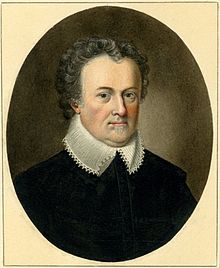...
But let us leave Queen Mab a while,
Through many a gate, o'er many a stile,
That now had gotten by this wile,
Her dear Pigwiggen kissing;
And tell how Oberon doth fare,
Who grew as mad as any hare,
When he had sought each place with care,
And found his queen was missing.
By grisly Pluto he doth swear,
He rent his clothes, and tore his hair,
And as he runneth here and there,
An acorn-cup he greeteth;
Which soon he taketh by the stalk,
About his head he lets it walk,
Nor doth he any creature balk,
But lays on all he meeteth.
The Tuscan poet doth advance
The frantic Paladine of France,
And those more ancient do enhance
Alcides in his fury,
And others Ajax Telamon:
But to this time there hath been none
So bedlam as our Oberon,
Of which I dare assure you.
And first encount'ring with a wasp,
He in his arms the fly doth clasp,
As tho' his breath he forth would grasp,
Him for Pigwiggen taking:
'Where is my wife, thou rogue?" quoth he,
"Pigwiggen, she is come to thee,
Restore her, or thou di'st by me."
Whereat the poor wasp quaking,
Cries, "Oberon, great Fairy King,
Content thee, I am no such thing;
I am a wasp, behold my sting!"
At which the fairy started;
When soon away the wasp doth go,
Poor wretch was never frighted so,
He thought his wings were much too slow,
O'erjoy'd they so were parted.
He next upon a glow-worm light,
(You must suppose it now was night)
Which, for her hinder part was bright,
He took to be a devil,
And furiously doth her assail
For carrying fire in her tail;
He thrash'd her rough coat with his flail,
The mad king fear'd no evil.
"Oh!" quoth the glow-worm "hold thy hand,
Thou puissant King of Fairy-land,
Thy mighty strokes who may withstand?
Hold, or of life despair I."
Together then herself doth roll,
And tumbling down into a hole,
She seem'd as black as any coal,
Which vext away the fairy.
From thence he ran into a hive,
Amongst the bees he letteth drive,
And down their combs begins to rive,
All likely to have spoiled:
Which with their wax his face besmear'd,
And with their honey daub'd his beard;
It would have made a man afear'd,
To see how he was moiled.
A new adventure him betides:
He met an ant, which he bestrides,
And post thereon away he rides,
Which with his haste doth stumble,
And came full over on her snout,
Her heels so threw the dirt about,
For she by no means could get out,
But over him doth tumble.
And being in this piteous case,
And all beslurried head and face,
On runs he in this wildgoose chase;
As here and there he rambles,
Half-blind, against a mole-hill hit,
And for a mountain taking it,
For all he was out of his wit,
Yet to the top he scrambles.
And being gotten to the top,
Yet there himself he could not stop,
But down on th' other side doth chop,
And to the foot came rumbling:
So that the grubs therein that bred,
Hearing such turmoil overhead,
Thought surely they had all been dead,
So fearful was the jumbling.
And falling down into a lake,
Which him up to the neck doth take,
His fury it doth somewhat slake,
He calleth for a ferry:
Where you may some recovery note,
What was his club he made his boat,
And in his oaken cup doth float,
As safe as in a wherry.
Men talk of the adventures strange
Of Don Quishott, and of their change,
Through which he armed oft did range,
Of Sancha Pancha's travel:
But should a man tell every thing,
Done by this frantic fairy king,
And them in lofty numbers sing,
It well his wits might gravel.
...
Nymphidia, The Court Of Fairy (excerpts)
Michael Drayton
(1)
Poem topics: breath, change, despair, evil, fear, fire, hair, life, light, never, night, time, together, travel, walk, wife, dear, fearful, place, great, Print This Poem , Rhyme Scheme
Submit Spanish Translation
Submit German Translation
Submit French Translation
Write your comment about Nymphidia, The Court Of Fairy (excerpts) poem by Michael Drayton
Best Poems of Michael Drayton
